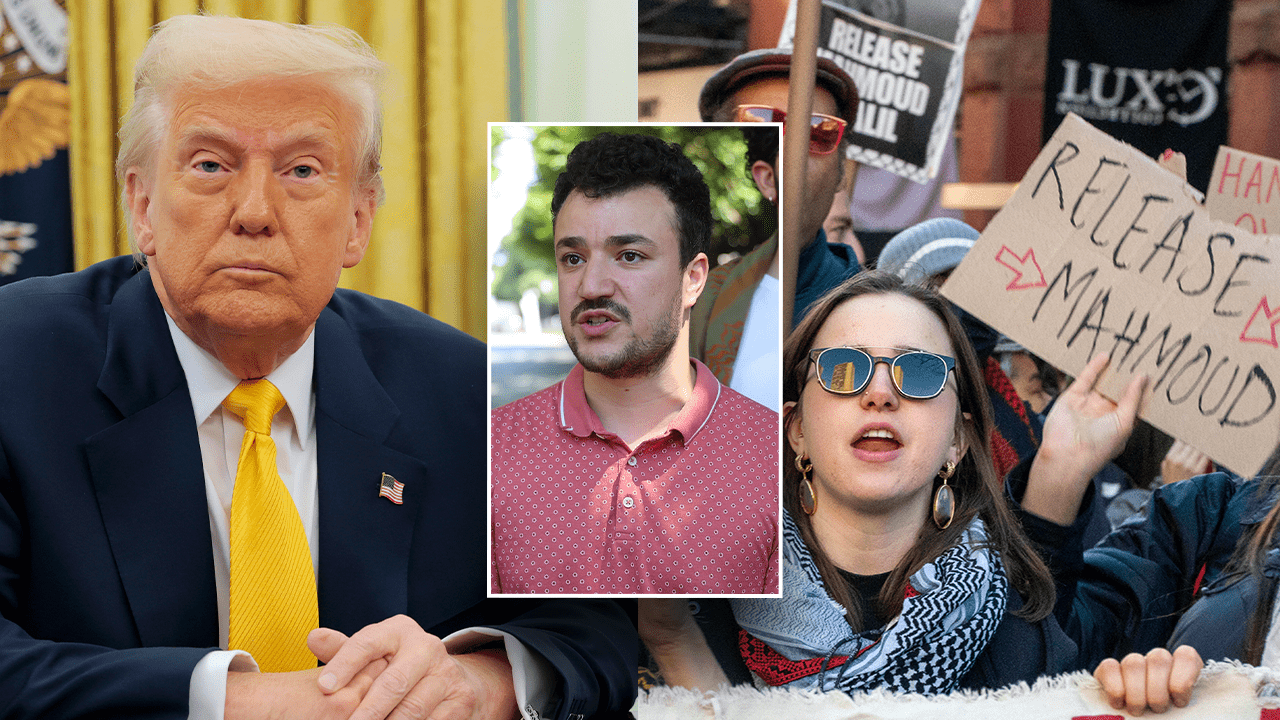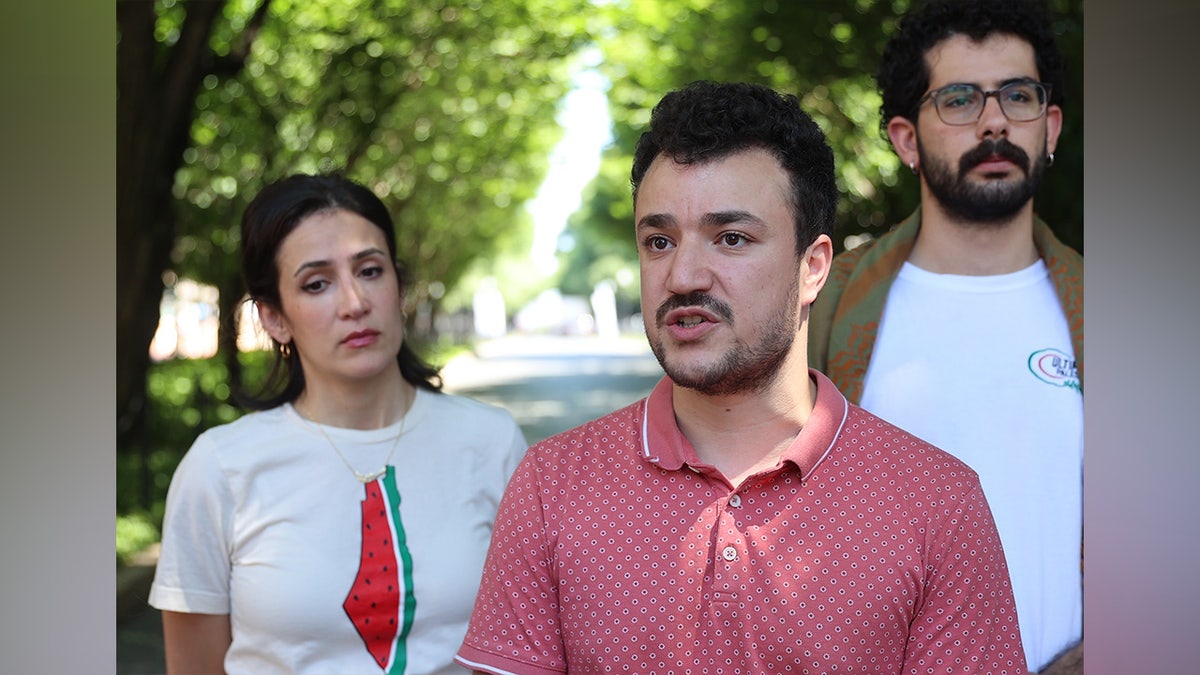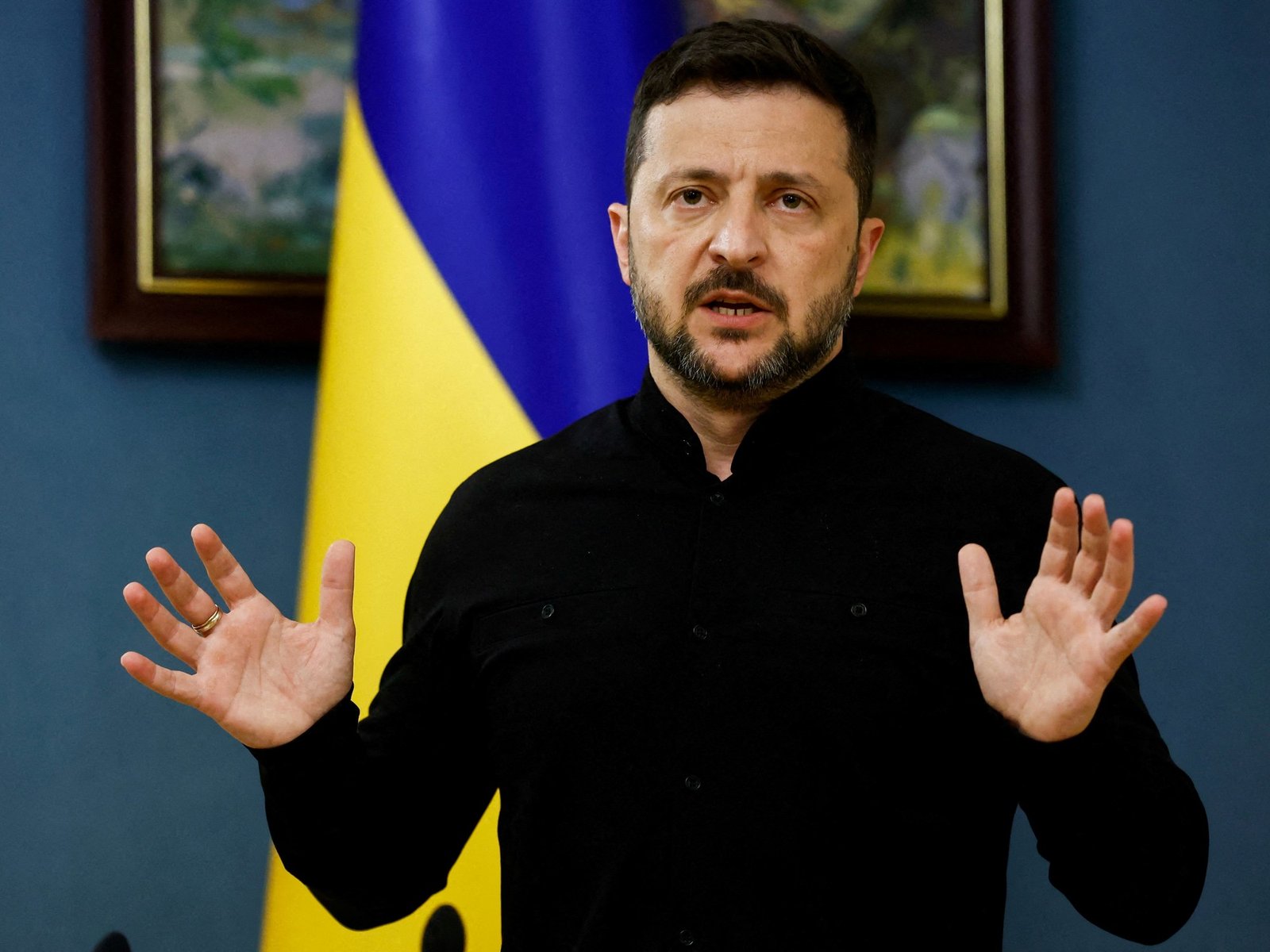INTERNACIONAL
Can the Trump administration deport green card holders? Here’s what rights they have in the US

The Trump administration is targeting international students with student visas and permanent residents who hold a green card as part of its immigration crackdown.
And while green card holders may legally remain in the U.S. indefinitely, work in the country, and are protected by U.S. laws, the Trump administration has made clear that the demographic is not off limits from its mass-deportation agenda.
Can the federal government deport those who are green card holders and are here in the U.S. legally?
Yes. According to U.S. Citizenship and Immigration Services, green card holders are only protected if they «do not commit any actions that would make you removable under immigration law.»
Green card holders are «required to obey all laws of the United States and localities,» file taxes annually, register for the draft if the green card holder is a male between the ages of 18 and 25, and are also «expected to support the democratic form of government,» per U.S. Citizenship and Immigraion Services.
Should a green card holder violate certain provisions included in the Immigration and Nationality Act, they could face deportation.
LAWYERS FOR COLUMBIA ANTI-ISRAEL ACTIVIST MAHMOUD KHALIL BLAST RUBIO EVIDENCE LETTER: ‘TWO PAGES, THAT’S IT’
People display signs during the May Day march and rally led by Immigrant Connexión Empowerment, Community Response Network and LULAC Oklahoma Chapter, from lower Scissortail Park to the Love’s Travel Stop Stage in the upper park, Sunday, May 4, 2025. (Doug Hoke/The Oklahoman/USA Today Network via Imagn Images)
Reasons a green card holder could be deported include the termination of conditional permanent resident status, knowingly helping someone enter the U.S. illegally, committing crimes including rape, murder or fraud, according to Berardi Immigration Law, a business immigration law firm that handles work permits and green cards for international employees working in the U.S.
Other reasons also include committing an aggravated felony, being convicted of drug or firearms crimes, and engaging in criminal activity that jeopardizes public safety or national security issues, per Berardi Immigration Law.
Furthermore, those who face convictions for these crimes may only face deportation after an immigration judge hears their case, according to Penn State Law School.
A green card allows an individual already in the U.S. who is not an American citizen to remain in the country, while a student visa allows those outside the U.S. to study in the country for a specific amount of time at an academic institution.
Eligibility for a green card is possible through several avenues, including being an immediate family member of a U.S. citizen like a spouse or parent, finding employment here in the U.S., or qualifying as a refugee or someone seeking asylum.
TRUMP COLLEGE CRACKDOWN: LIST OF STUDENTS DETAINED AMID ANTISEMITISM ON CAMPUSES

The possibility of deporting green card holders attracted increased scrutiny after U.S. Immigration and Customs Enforcement (ICE) agents arrested anti-Israel activist Mahmoud Khalil, pictured here, in March. (Selcuk Acar/Anadolu via Getty Images)
The possibility of deporting green card holders attracted increased scrutiny after U.S. Immigration and Customs Enforcement (ICE) agents arrested anti-Israel activist Mahmoud Khalil in March. Khalil, who is a Palestinian raised in Syria and a permanent U.S. resident with a green card who first came to the U.S. on a student visa in 2022, played a major role in the protests against Israel while at Columbia University as a graduate student.
The Department of Homeland Security said Khalil was arrested to protect U.S. national security, and claimed that Khalil «led activities aligned to Hamas, a designated terrorist organization.»
Additionally, Secretary of State Marco Rubio said at the time any Hamas supporters in the U.S. would suffer similar fates and have their green cards pulled, and face deportation.
Likewise, President Donald Trump said in a social media post in March following Khalil’s arrest that it was «the first arrest of many to come.»
CLICK HERE TO GET THE FOX NEWS APP
But Democrats claim the Trump administration is out of line and the arrest was an assault on freedom of speech. Senate Judiciary Committee Democrats said Khalil’s arrest amounted to «straight up authoritarianism» in a post on X in March.
An immigration judge in Louisiana ruled in April that the Trump administration was at liberty to deport Khalil, claiming she didn’t have the authority to challenge the Trump administration’s assessment that Khalil posed a national security threat.
But Khalil, who is currently stuck at the Central Louisiana ICE Processing Center, has yet to see whether he will face deportation. Another federal judge in New York has blocked the Trump administration from removing Khalil from the U.S. while his case plays out in court.
Separately, the Trump administration is also eyeing ways to beef up vetting for those entering the U.S. on student visas — particularly for those who’ve publicly supported Palestine, like Khalil.
For example, the State Department is also bracing itself to ramp up social media screening for those applying for student visas. The State Department announced Tuesday that it is temporarily suspending new student and exchange visitor visa interviews as it evaluates enhanced social media screenings for the application process.
CONGRESS ‘ENTITLED’ TO ‘REGULATING THE CONDUCT’ OF VISA HOLDERS, EXPERT SAYS AMID DEPORTATION PUSH

Secretary of State Marco Rubio testifies before the Senate Committee on Foreign Relations hearing to examine the President’s proposed budget request for fiscal year 2026 for the Department of State on Capitol Hill in Washington, Tuesday, May 20, 2025. (Jose Luis Magana/The Associated Press)
Rubio told lawmakers May 20 that he expects that the State Department has already pulled thousands of visas since January following Trump’s inauguration. That’s up from the 300 the administration had revoked as of late March.
Rubio also said that his agency would continue to pull student visas, stating that a visa is not a right, it’s a «privilege.»
«I don’t know the latest count, but we probably have more to do,» Rubio told lawmakers on the Senate appropriations subcommittee overseeing foreign affairs. «We’re going to continue to revoke the visas of people who are here as guests and are disrupting our higher education facilities.»
Immigration,Donald Trump,Marco Rubio,State Department,Homeland Security
INTERNACIONAL
Volodimir Zelenski insiste en reunirse con Vladimir Putin mientras Rusia intensifica los bombardeos en Ucrania

Contactos en Turquía
Qué se está negociando
Ataques con drones y bombas
INTERNACIONAL
Anti-ICE attackers revealed to have extensive history of radical protest activities

NEWYou can now listen to Fox News articles!
Some members of the group charged in the Prairieland Detention Center anti-ICE attack on Independence Day have been arrested in the past for protest activities.
Ines Soto, who is part of the group of ten charged with attempted murder of federal officers and firearm offenses, was arrested at a protest in 2016 for allegedly resisting arrest and trying to avoid detention, according to K-HOU 11 at the time.
The protest was against a speech by Richard Spencer at Texas A&M University. The outlet My Aggie Nation noted that Soto was 31 in 2016, which corroborates with a KERA News report stating that Soto is now 40 years old and was released on a $10,000 bond.
FBI CAPTURES FORMER MARINE CORPS RESERVIST ACCUSED OF SHOOTING AT ICE OFFICERS AT TEXAS DETENTION CENTER
Ten suspects were charged with attempted murder of a federal officer in connection with the July 4, 2025, ambush attack on the Prairieland Detention Center in Alvarado, Texas. (Johnson County Sheriff’s Office)
Meanwhile, KERA News reported that Savanna Batten partook in the Occupy Wall Street movement through an «Occupy Dallas» protest in 2011, where she was arrested for allegedly not allowing people to come and go from a Chase Bank. The case was ultimately dismissed, as a criminal trespassing charge was scrapped in exchange for 24 community service hours, the outlet reported.
Batten also specifically has a history of anti-ICE activism, as she was charged for allegedly blocking a highway in June 2018 near a Dallas ICE facility, and the charge for that was also dismissed in 2019 as part of a program.
Fox News Digital reported last week that Benjamin Song, who was captured by the FBI last week, had a known protest background. He was named in a 2023 lawsuit over a counter-protest to the New Columbia Movement at a drag brunch in Fort Worth, Texas. The lawsuit noted Song was tied with a pro-arms leftist group, the Elm Fork John Brown Gun Club.
UNEARTHED SOCIAL MEDIA POSTS EXPOSE RADICAL VIEWS OF ANTI-ICE SHOOTING SUSPECT CAPTURED BY FBI

During the Prairieland Detention Center attack, cars were vandalized with anti-ICE messages such as «Ice Pig.» (Justice Department)
In addition, he was also arrested in 2020 during a protest in Austin for allegedly assaulting a public servant, according to Fox 4.
Song’s social media profiles also indicated that he was extremely vocal online about his stances and activism, and also appeared to use a martial arts studio tied to his mother to film tactical exercises.
CLICK HERE FOR MORE IMMIGRATION COVERAGE
«Do you want to end mass shootings? Abolish the police,» he posted in June 2022 under the X handle, BubbleBreakBS.
Song, a former U.S. Marine Corps reservist, is accused of firing two AR-15-style rifles at two correctional officers and one Alvarado police officer, according to a criminal complaint obtained by Fox News Digital.
MORE DETAILS REVEALED ON SUSPECTS IN INDEPENDENCE DAY ICE ATTACK IN TEXAS

Savanna Batten (left) and Ines Soto (right) are both charged with attempted murder and firearms offenses in an anti-ICE Texas attack on July 4, 2025. (Johnson County Jail/)
«Make no mistake, this was not a peaceful protest,» Acting U.S. Attorney Nancy E. Larson said in a July 8 statement. «This was an ambush on federal and local law enforcement officers. This increasing trend of violence against law enforcement will not be tolerated in the Northern District of Texas. Those who use violence against law enforcement officers will be found and prosecuted using the toughest criminal statutes and penalties available.»
CLICK HERE TO GET THE FOX NEWS APP
A local police officer was shot in the neck by a suspect in the woods, according to the complaint. Another assailant allegedly fired dozens of rounds at unarmed correctional officers who had stepped outside the facility. Cars outside the facility were vandalized with «Ice pig» and «Traitor,» as authorities obtained anti-government literature from those involved, as well as a flag that said «Fight Fascism, Fight Oligarchy.»
Fox News Digital’s Greg Wehner and Stephen Sorace contributed to this report.
INTERNACIONAL
De “Hey Jude” a “Hotel California”: 40 letras de canciones que hicieron historia

Hay canciones que pasan a la historia, ya sea por su melodía, por las voces que las interpretan o sus letras. The Independent realizó un ranking de las 40 mejores letras de canciones en inglés de todos los tiempos. Bandas como Nirvana, The Beatles o Abba forman parte del listado. Según el ranking, las canciones se destacaron no solo por su música o interpretación, sino también por la fuerza de sus palabras, capaces de dejar una huella en distintas generaciones.
La lista está encabezada por ‘All Apologies’ de Nirvana. El tema está incluido en el álbum In Utero de 1993. Cobain escribió esta canción dirigiéndose tanto a Courtney Love como a su hija, Frances Bean. Para muchos, este track logra transmitir con especial nitidez el malestar interno y la rabia del músico, a la vez que se entrelaza con una profunda declaración de amor hacia su familia.
Según The Independent, el mensaje contenido en esta canción supera la tragedia personal de Cobain y subraya la permanencia del afecto más allá de la ausencia física. Apenas seis meses después del lanzamiento, el artista se quitó la vida y dejó atrás de sí un tema que muchos consideran imprescindible para comprender el significado de su legado artístico.
El listado continúa con Nine Inch Nails, ‘Hurt’. El tema, escrito e interpretado por Trent Reznor, hace un retrato directo de la autodestrucción y el sufrimiento, elementos presentes desde la primera grabación. Si bien Reznor nunca precisó si el trasfondo hace referencia al consumo de heroína, el texto y la atmósfera de la canción transmiten una carga emotiva que oscila entre el dolor y una poesía sombría.
Joy Division con su hit ‘Love Will Tear Us Apart’ da continuidad al ranking. “¿Por qué el dormitorio está tan frío volteado de tu lado?, ¿Mi sincronización es tan imperfecta, nuestro respeto se ha agotado?“, cita la letra. El sencillo, escrito por Ian Curtis, refleja matices de su propia experiencia personal, marcada por la crisis matrimonial y una inminente tragedia.
La canción sobresale por una combinación de melodía vibrante y una lírica de gran vulnerabilidad. La composición no transmite un mensaje sombrío en sí mismo, sino que transforma su tristeza en una pieza conmovedora, donde la humanidad del autor adquiere toda su dimensión.
Arcade Fire, ‘Sprawl II Mountains Beyond Mountains’ continúa la lista. Junto a la voz de Régine Chassagne, la canción aporta una atmósfera única. La melodía logra materializar emociones latentes y anhelos de escapar de la uniformidad.
El ranking, presentado por The Independent, sigue con Beyoncé, ‘Formation’; Laura Marling, ‘Ghosts’; LCD Soundsystem, ‘Losing My Edge’; Leonard Cohen, ‘So Long, Marianne’; The Libertines, ‘Can’t Stand Me Now’; Kate Bush, ‘Cloudbusting’; Nick Cave, ‘Into My Arms’; The Sisters of Mercy, ‘This Corrosion’ y Sultans of Ping FC con ‘Where’s Me Jumper?’
Seguidamente, el medio español posicionó entre los mejores temas a ‘There Is a Light That Never Goes Out’, de The Smiths; ‘I’m On Fire’ de Bruce Springsteen; ‘Father Lucifer’ de Tori Amos; ‘Black Steel in the Hour of Chaos’ de Public Enemy y ‘Pools (Drank)’ de Kendrick Lamar.
Mientras la comunidad afroamericana afrontaba las consecuencias de políticas conservadoras, Prince decidió abordar en su tema principal cuestiones como la violencia asociada a las pandillas, la pandemia del sida, tensiones políticas y catástrofes naturales. Con este enfoque, el cantante dejó atrás su aislamiento creativo y presentó ‘Sign O ‘The Times’, una canción donde la reflexión social y el comentario sobre realidades urgentes pasaron a primer plano.
En el listado no podían faltar los Rolling Stones. Si bien tienen grandes letras, en ‘Gimme Shelter’ recrean la atmósfera de inestabilidad y amenaza constante de la época. La composición captura el miedo y la incertidumbre de una sociedad al borde de la ruptura. Asimismo consolida el legado de Mick Jagger, Keith Richards y sus compañeros como cronistas musicales de un periodo turbulento.
Si de turbulencias se trata, David Bowie es uno de los artistas que, durante su vida, atravesó momentos turbulentos. Estos periodos fueron de gran inspiración para el músico a la hora de componer. ‘Station to Station’ es una de las canciones grabadas en los días más oscuros de Bowie. El músico lidiaba con su adicción a las drogas en Los Ángeles mientras buscaba refugio en las letras.
El ranking continúa con ‘Supersonic’, de Oasis; ‘Born Slippy’ de Underworld; ‘Landslide’ de Fleetwood Mac; ‘Graceland’ de Paul Simon; ‘Take a Walk on the Wild Side’ de Lou Reed; ‘Every Time the Sun Comes Up’, de Sharon Van Etten; ‘Gloria’ de Patti Smith; y ‘Hotel California’ de Eagles.

Thin Lizzy sigue el listado con ‘The Boys are Back in Town’. Le sigue Nina Simone con ‘Four Women’; St. Vincent ‘Digital Witnesses’; Frank Ocean con ‘Pink + White’. El ranking continúa con ‘Dinner at Eight’ de Rufus Wainwright; ‘It’s Alright Ma’’ de Bob Dylan; ‘The Winner Takes it All’ de Abba y ‘I Wanna Be Adored’ de The Stone Roses.
En los tres últimos puestos se encuentran ‘The World is Yours’ de Nas; ‘When I’m Sixty Four’ de The Beatles y Beck con ‘Loser’. Este último es uno de los éxitos más recordados de Beck. Surgió a partir de una autocrítica espontánea después de escuchar una versión preliminar del tema. El propio músico reconoció sentirse «el peor rapero del mundo» y se definió como “un perdedor”.
Esta percepción no solo alimentó el concepto de la canción, sino que inspiró el famoso estribillo que acabó identificando al tema. A pesar de la aparente falta de coherencia en la letra, la composición logra crear una atmósfera singular gracias a su escritura en flujo de conciencia, un recurso que genera magnetismo incluso en lo absurdo.

 POLITICA3 días ago
POLITICA3 días agoJuan Carlos Maqueda defendió la condena contra Cristina Kirchner: “Hay una sensación de que se hizo Justicia y que no hay impunidad”

 POLITICA2 días ago
POLITICA2 días agoExpulsada del Gobierno, Victoria Villarruel empieza a tomar distancia, pero no tiene proyecto político para este año

 POLITICA2 días ago
POLITICA2 días agoLa CGT evalúa adelantar a octubre el recambio de sus autoridades y define una movilización contra Milei



































